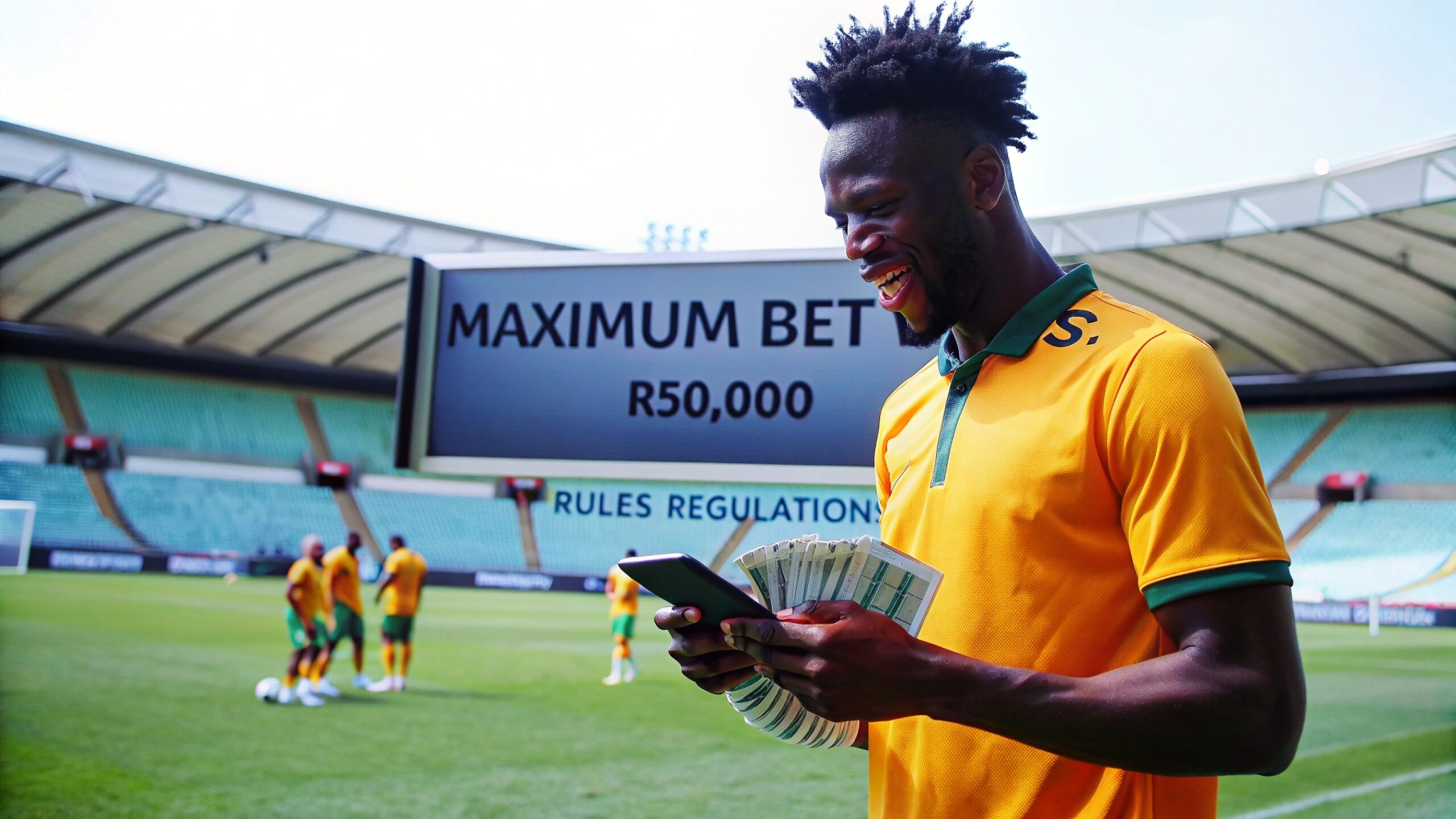Betting in South Africa has grown massively over the last decade, thanks to the increasing popularity of sports and online gambling. But have you ever wondered how much you can actually bet? Let’s dive into the legal landscape and uncover the limits bookmakers impose here.
Overview of South African Gambling Laws
South Africa’s gambling industry operates under a strict and well-defined legal framework primarily governed by the National Gambling Act of 2004. This act was designed to regulate all forms of gambling in the country, including betting shops, casinos, and online platforms. Its main purpose is to ensure gambling activities are conducted fairly and transparently, protecting both the players and the integrity of the industry. The law sets out licensing requirements, operational standards, and consumer protections that all bookmakers must adhere to. It also criminalizes illegal betting activities to prevent fraud and exploitation.
Role of the National Gambling Board (NGB)
The National Gambling Board (NGB) serves as the central regulatory authority overseeing gambling across South Africa. Its primary responsibilities include licensing gambling operators, monitoring their compliance with laws, and ensuring the industry remains safe and fair for all participants. The NGB works closely with provincial gambling boards, which regulate gambling within their respective regions. This collaboration helps maintain a consistent standard of regulation throughout the country.
A critical part of the NGB’s role involves promoting responsible gambling practices. This means the NGB not only enforces rules around betting but also guides bookmakers in setting reasonable maximum bet limits. These limits are essential tools to reduce the risk of gambling addiction and financial harm. Additionally, the NGB conducts audits, investigations, and educational campaigns aimed at keeping gambling safe, fair, and transparent for all South Africans.
How Regulations Affect Betting Limits
South African gambling regulations do not explicitly dictate the exact maximum bet amounts bookmakers must set. Instead, they require all licensed operators to establish and enforce reasonable betting limits as part of their responsible gambling policies. This flexibility allows bookmakers to tailor their limits based on the types of bets, sports, and player profiles while still protecting consumers from risky gambling behavior.
In practice, this means the maximum bet you can place will vary depending on the bookmaker you choose, the event you are betting on, and the province’s regulatory requirements. However, no operator can allow bets that put the player or themselves at undue risk, and the NGB actively monitors adherence to these principles. Bookmakers typically disclose their maximum bet limits in their terms and conditions, and they often adjust these limits dynamically based on risk assessments and responsible gambling strategies.
Maximum Bets in South African Bookmakers
What Are Maximum Bets
Simply put, a maximum bet is the highest amount of money that a player is allowed to wager on a single bet with a bookmaker. This limit acts as a safety barrier designed to protect both the bookmaker and the bettor from excessive financial risk. By capping the amount of money that can be staked on any given bet, bookmakers create a controlled environment where neither side is exposed to potentially devastating losses. This limit applies across various types of bets, including sports betting, casino games, and special wagers.
Maximum bets serve several important functions in the betting world. They prevent sudden large-scale losses for the bookmaker, ensuring the business remains financially stable. For players, these limits help maintain responsible betting habits by avoiding overly risky or impulsive wagers. It is important to note that these maximum limits differ among bookmakers and betting types, and they can also vary depending on the popularity and volatility of the event being wagered on.
Key points about maximum bets include:
- It is the largest single stake allowed per bet.
- Limits help balance risk between the bookmaker and bettor.
- Different types of bets and games may have different maximum limits.
- Limits vary by bookmaker and jurisdiction within South Africa.
- Maximum bets encourage responsible gambling behavior.
Why Do Bookmakers Set Maximum Bets
Bookmakers impose maximum bet limits primarily to manage their financial risk. Accepting very large bets without any restrictions could expose bookmakers to significant liabilities. For example, if a few bettors place massive wagers on unlikely outcomes and win, the bookmaker might suffer heavy financial losses that could threaten their solvency. By capping the maximum bet amount, bookmakers reduce their exposure to these rare but potentially devastating payouts.
Aside from protecting their own finances, bookmakers also set maximum bets to promote responsible gambling. High-stake bets can encourage reckless betting behavior, which may lead to problem gambling or addiction. By limiting the amount that players can wager at once, bookmakers help prevent bettors from risking more than they can afford to lose. This approach aligns with the requirements of regulatory bodies like South Africa’s National Gambling Board, which emphasize player protection and safe gambling environments.
The main reasons bookmakers set maximum bets are:
- To limit financial risk from large, unpredictable payouts.
- To maintain business stability and protect their bottom line.
- To encourage responsible gambling among players.
- To comply with regulatory requirements set by gambling authorities.
- To protect players from excessive losses and impulsive betting behavior.
Typical Maximum Bet Limits in South African Bookmakers
Sports Betting Maximum Bets
In South Africa, sports betting is incredibly popular, especially for sports such as soccer, rugby, and cricket. For these mainstream sports, the maximum bet limits usually range from R10,000 to R50,000 per wager. The exact amount depends on the bookmaker’s policies and the specific event being bet on. For example, everyday league matches may have higher limits to encourage more betting, while high-profile international events like the FIFA World Cup or the Super Rugby final often have stricter maximum bet limits to reduce risk due to the high stakes involved.
Bookmakers also consider the popularity and volatility of the event when setting these limits. Betting on major tournaments attracts a large number of bettors, and thus the risk exposure increases. To balance this, bookmakers often lower the maximum allowed bets or offer tiered limits based on player status. This helps protect their business while still offering an exciting betting experience to customers.
Casino and Slots Maximum Bets
Casino games have a different approach when it comes to maximum bets. Slot machines, for instance, usually have much lower maximum bet limits, typically ranging from R100 to R1,000 per spin. This limitation helps control volatility and limits the potential for rapid large losses on highly random games. Because slot outcomes can change drastically with each spin, the low maximum bet acts as a financial safeguard for both the player and the casino.
In contrast, table games such as blackjack or roulette usually permit higher maximum bets but within carefully defined limits. These games are more skill-based or predictable in certain contexts, which allows casinos to handle larger stakes. However, the maximum bet is still capped to maintain a balanced risk profile. The limits vary by casino and game type, but they generally follow strict guidelines to keep gameplay safe and fair.
Variations by Bookmaker
Each bookmaker in South Africa sets their own maximum bet limits, operating within the framework of national and provincial gambling regulations. This means that while there is some consistency, significant variation exists between different operators. Larger online bookmakers often offer higher maximum bets, especially for VIP players or customers with long-standing accounts and proven betting behavior.
Smaller or physical betting shops tend to have more conservative limits, partly due to higher risk exposure and lower capital reserves. Some bookmakers also adjust limits dynamically based on current market demand and player activity. This means your maximum bet allowance might differ depending on which bookmaker you use and the type of bet you are placing.
| Betting Category | Typical Max Bet Range (ZAR) | Examples of Events/Games | Notes |
| Sports Betting | R10,000 – R50,000 | Soccer leagues, Rugby, Cricket | Higher limits for regular matches, lower for major events like FIFA World Cup |
| Slots | R100 – R1,000 | Online and physical slot machines | Low limits to control volatility |
| Table Games (Casino) | R1,000 – R20,000 | Blackjack, Roulette | Higher limits but regulated strictly |
| VIP/High Roller Bets | Up to R100,000+ | Selected clients and high-stakes games | Usually by invitation or special status |
Factors Influencing Maximum Bet Limits
Type of Sport or Game
The type of sport or game plays a crucial role in determining the maximum bet limits offered by bookmakers. Some sports, especially those with unpredictable outcomes or lower liquidity in betting markets, are considered riskier for bookmakers. For example, niche or emerging sports might have lower maximum bets to protect bookmakers from large unexpected payouts. Conversely, highly liquid and well-studied markets like soccer and rugby often allow higher maximum bets due to the volume of bets and available data to manage risk.
High-volatility markets—where outcomes can swing dramatically, such as in-play bets or exotic prop bets—tend to have stricter bet caps. This reduces the bookmaker’s financial exposure to sharp bettors or sudden market shifts, ensuring stability in their betting books.
Player’s Account Status and History
Bookmakers typically assess each player’s account status and betting history before setting maximum bet limits. Players who have demonstrated responsible betting behavior, consistently met wagering requirements, and maintained long-term accounts are often granted higher maximum bets. This trust-based approach rewards loyal customers and encourages them to keep betting with the same operator.
On the other hand, new players or accounts with irregular betting patterns might face more conservative limits until the bookmaker can verify their profile and risk level. This system protects both the player from potential financial harm and the bookmaker from fraudulent or high-risk betting activity.
Bookmaker Risk Management Policies
Each bookmaker develops its own risk management policies to safeguard against potential losses. These policies consider the bookmaker’s financial health, market exposure, and operational capacity. As a result, maximum bet limits are not static; they can be adjusted dynamically based on ongoing risk assessments and business needs.
For example, if a bookmaker experiences high volume or volatility in certain markets, they may temporarily reduce maximum bets to mitigate risk. Similarly, during special events or promotions, limits might be increased or decreased to balance player demand with operational safety. This flexible approach ensures bookmakers can remain profitable while offering an attractive betting environment.




